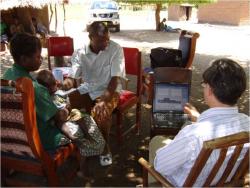Project 12: Safety
 Project Title
Project Title
| A Drug Safety Register for the ACT Consortium |
Project Location(s)
|
Cross-cutting pharmacovigilance initiative, receiving data from all consortium projects. |
Lead Principal Investigator
|
Prof David Lalloo MB BS MD FRCP FFTM RCPS, is a Professor in Clinical Tropical Medicine and head of the Clinical Research Group at the Liverpool School of Tropical Medicine (LSTM). David trained in General (Internal) Medicine, Infectious Diseases and Tropical Medicine, spending three years in Papua New Guinea. He undertook clinical and laboratory research in Oxford before moving to LSTM in 1999. Since then he has focused on clinical trials in the tropics, particularly in HIV related infections, malaria and envenoming. Previous work on malaria included a trial in Malawi examining the effect of adherence on effectiveness of chlorproguanil-dapsone in uncomplicated malaria. |
Other Principal Investigators
|
Ms Cheryl Pace, Research Pharmacist, Liverpool School of Tropical Medicine (LSTM) Contact: cheryl.pace@liverpool.ac.uk Prof Munir Pirmohamed, Professor of Clinical Pharmacology, School of Biomedical Sciences, University of Liverpool Dr Dianne (Anja) Terlouw, Clinical Epidemiologist, LSTM Prof Steve Ward, Professor of Parasitology, LSTM |
Research Aim(s)
| Safety |
Project Background and Rational
|
The use of a medicine in any condition and any setting depends on the benefit-harm balance of that medicine. Much less is known about the potential harms associated with ACT antimalarial medicines in comparison with the benefits. Clinical trials to date have indicated that this group of medicines are safe and effective, and there is no evidence to suggest concern with the rapidly increasing use of the ACTs over the past few years. However, most of the current safety data is based treatment trials where the patient experiences a single exposure to the medicine. Also, until recently the majority of artemisinin use had been in adults in areas of low malaria transmission. For example, in South-East Asia, adults are unlikely to be treated more than once a year. Following the now widespread programmatic implementation of ACTs in national control programmes in Africa, the average child in Sub-Saharan Africa may be treated 3 or more times a year, so any remaining issues surrounding the safety of ACTs are much more likely to become apparent in this setting. Also, in contrast to Asia, the majority of treatment of uncomplicated malaria in sub-Saharan Africa occurs outside the health system, with dosing based on age. Using age, as opposed to weight for drug-dosing is less precise, particularly in young children and results in increased risks of under and overdosing. Further information is also required on actual and potential drug interactions, particularly with tuberculosis and HIV medication. There is currently a lack of infrastructure at national levels in Africa and Asia to support adverse drug reaction (ADR) reporting schemes and although there is a need to develop these systems, this is not going to be achieved in the short-term |
Current Status of Project
|
The Centralised Safety Database for the storage and analysis of safety data has been installed at the Liverpool School of Tropical Medicine, in partnership with the MiP Consortium. The database has been fully validated and entry of safety data from the ACT Consortium has commenced. Data is being assessed continuously for any emerging safety signals. |

